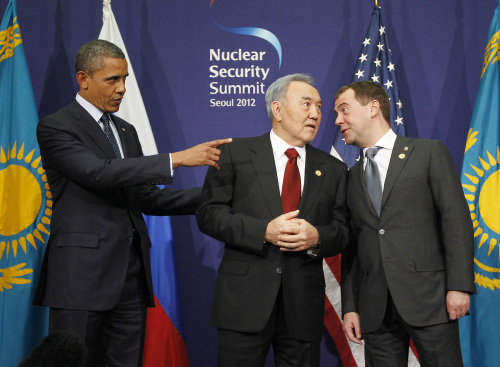Leaders share measures in ‘atmosphere of agreement’
By Korea HeraldPublished : March 27, 2012 - 20:43
World leaders taking part in the Nuclear Security Summit reaffirmed their agreement on the importance of nuclear security and stressed the need for international cooperation during Tuesday’s morning session.
“During the morning session, 27 leaders spoke out introducing their nuclear security policies and shared the view on the importance of the issue,” South Korea’s spokesperson and Sous-Sherpa Han Choong-hee said.
“The leaders also introduced the measures their countries have taken, and discussed ways to go about getting more countries to join the efforts.”
“During the morning session, 27 leaders spoke out introducing their nuclear security policies and shared the view on the importance of the issue,” South Korea’s spokesperson and Sous-Sherpa Han Choong-hee said.
“The leaders also introduced the measures their countries have taken, and discussed ways to go about getting more countries to join the efforts.”

He added that the state leaders and international organizations also discussed the need to take nuclear security beyond physical security measures by increasing related education and training.
He added that the leaders were also in agreement over the need to increase international cooperation in the efforts to prevent illegal trading of nuclear materials.
According to Han a similar atmosphere of general agreement on nuclear security and safety issues continued throughout the working lunch that followed the morning session.
Han said that many of the attendants discussed the Fukushima incident and raised the issue of enhancing the connection between security and safety in nuclear issues. Japan’s Fukushima Daiichi nuclear power station continues to be a major hazard more than a year after it broke down after an earthquake and tsunami on March 11, 2011.
“Many countries, led by the EU, raised the issue of subjecting existing nuclear facilities to a stress test to review their integrity, and for the need to raise safety standards,” Han said. He added that the leaders also stressed the importance of the role of the International Atomic Energy Agency, saying the organization needed to provide countries with direction and guidance in related matters.
Han also said that the second Nuclear Security Summit is different from the Washington summit in that several joint statements have been drawn up among the participating nations.
“A number of countries have agreed to collaborative projects, and that is a good example for a cooperation model,” Han said.
“Because the nations taking part in such projects are doing so voluntarily, the projects can develop flexibly and quickly.”
According to Han about seven joint statements and projects had been drawn up by the time of the briefing at 2 p.m. on Tuesday.
The joint projects include a four-way collaboration between Belgium, France, Netherlands and the U.S. to replace highly enriched uranium-based production of medical isotopes. The U.S. and the two European nations are also collaborating with Korea to reduce the amount of HEU used in research reactors.
Japan has led the efforts for international cooperation in the field of transport security, while the U.K. is pushing a joint statement on the issue of sensitive information security.
The Japan-led project has brought together Korea, France, U.K. and the U.S. to discuss problems in transporting nuclear materials. The results of the discussions will be presented at the next Nuclear Security Summit.
By Choi He-suk (cheesuk@heraldcorp.com)
-
Articles by Korea Herald



















